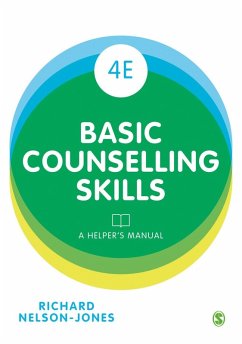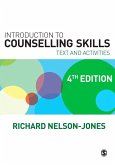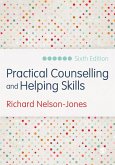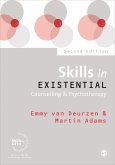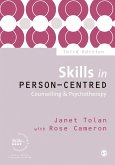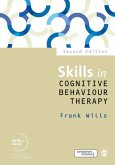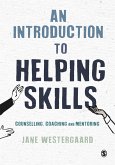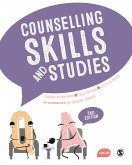40,95 €
40,95 €
inkl. MwSt.
Sofort per Download lieferbar

20 °P sammeln
40,95 €
Als Download kaufen

40,95 €
inkl. MwSt.
Sofort per Download lieferbar

20 °P sammeln
Jetzt verschenken
Alle Infos zum eBook verschenken
40,95 €
inkl. MwSt.
Sofort per Download lieferbar
Alle Infos zum eBook verschenken

20 °P sammeln
- Format: PDF
- Merkliste
- Auf die Merkliste
- Bewerten Bewerten
- Teilen
- Produkt teilen
- Produkterinnerung
- Produkterinnerung

Bitte loggen Sie sich zunächst in Ihr Kundenkonto ein oder registrieren Sie sich bei
bücher.de, um das eBook-Abo tolino select nutzen zu können.
Hier können Sie sich einloggen
Hier können Sie sich einloggen
Sie sind bereits eingeloggt. Klicken Sie auf 2. tolino select Abo, um fortzufahren.

Bitte loggen Sie sich zunächst in Ihr Kundenkonto ein oder registrieren Sie sich bei bücher.de, um das eBook-Abo tolino select nutzen zu können.
This practical bestseller from leading expert Richard Nelson-Jones introduces the essential counselling skills for the helping professions. Now in its fourth edition, it guides you through the key skills for helping work across a range of settings, such as counselling, nursing, social work, youth work, education and many more. It explores 17 key counselling skills, including:
-asking questions
-monitoring
-facilitating problem solving
-negotiating homework
Each chapter describes a particular skill, illustrates it using clear case examples across a range of settings and then…mehr
- Geräte: PC
- mit Kopierschutz
- eBook Hilfe
- Größe: 1.11MB
Andere Kunden interessierten sich auch für
![Introduction to Counselling Skills (eBook, PDF) Introduction to Counselling Skills (eBook, PDF)]() Richard Nelson-JonesIntroduction to Counselling Skills (eBook, PDF)48,95 €
Richard Nelson-JonesIntroduction to Counselling Skills (eBook, PDF)48,95 €![Practical Counselling and Helping Skills (eBook, PDF) Practical Counselling and Helping Skills (eBook, PDF)]() Richard Nelson-JonesPractical Counselling and Helping Skills (eBook, PDF)52,95 €
Richard Nelson-JonesPractical Counselling and Helping Skills (eBook, PDF)52,95 €![Skills in Existential Counselling & Psychotherapy (eBook, PDF) Skills in Existential Counselling & Psychotherapy (eBook, PDF)]() Emmy Van DeurzenSkills in Existential Counselling & Psychotherapy (eBook, PDF)37,95 €
Emmy Van DeurzenSkills in Existential Counselling & Psychotherapy (eBook, PDF)37,95 €![Skills in Person-Centred Counselling & Psychotherapy (eBook, PDF) Skills in Person-Centred Counselling & Psychotherapy (eBook, PDF)]() Janet TolanSkills in Person-Centred Counselling & Psychotherapy (eBook, PDF)32,95 €
Janet TolanSkills in Person-Centred Counselling & Psychotherapy (eBook, PDF)32,95 €![Skills in Cognitive Behaviour Therapy (eBook, PDF) Skills in Cognitive Behaviour Therapy (eBook, PDF)]() Frank WillsSkills in Cognitive Behaviour Therapy (eBook, PDF)39,95 €
Frank WillsSkills in Cognitive Behaviour Therapy (eBook, PDF)39,95 €![An Introduction to Helping Skills (eBook, PDF) An Introduction to Helping Skills (eBook, PDF)]() Jane WestergaardAn Introduction to Helping Skills (eBook, PDF)37,95 €
Jane WestergaardAn Introduction to Helping Skills (eBook, PDF)37,95 €![Counselling Skills and Studies (eBook, PDF) Counselling Skills and Studies (eBook, PDF)]() Fiona Ballantine DykesCounselling Skills and Studies (eBook, PDF)32,95 €
Fiona Ballantine DykesCounselling Skills and Studies (eBook, PDF)32,95 €-
-
-
This practical bestseller from leading expert Richard Nelson-Jones introduces the essential counselling skills for the helping professions. Now in its fourth edition, it guides you through the key skills for helping work across a range of settings, such as counselling, nursing, social work, youth work, education and many more. It explores 17 key counselling skills, including:
-asking questions
-monitoring
-facilitating problem solving
-negotiating homework
Each chapter describes a particular skill, illustrates it using clear case examples across a range of settings and then helps you consolidate and practise what you've learned through a set of creative activities.
Further chapters cover professional issues including a new chapter on managing crises and chapters on ethical dilemmas, supervision, working with diversity and more.
-asking questions
-monitoring
-facilitating problem solving
-negotiating homework
Each chapter describes a particular skill, illustrates it using clear case examples across a range of settings and then helps you consolidate and practise what you've learned through a set of creative activities.
Further chapters cover professional issues including a new chapter on managing crises and chapters on ethical dilemmas, supervision, working with diversity and more.
Dieser Download kann aus rechtlichen Gründen nur mit Rechnungsadresse in A, D ausgeliefert werden.
Produktdetails
- Produktdetails
- Verlag: SAGE Publications
- Seitenzahl: 216
- Erscheinungstermin: 12. Dezember 2015
- Englisch
- ISBN-13: 9781473943995
- Artikelnr.: 43976737
- Verlag: SAGE Publications
- Seitenzahl: 216
- Erscheinungstermin: 12. Dezember 2015
- Englisch
- ISBN-13: 9781473943995
- Artikelnr.: 43976737
- Herstellerkennzeichnung Die Herstellerinformationen sind derzeit nicht verfügbar.
Richard Nelson-Jones was born in London in 1936. Having spent five years in California as a Second World War refugee, he returned in the 1960s to obtain a Masters and Ph.D from Stanford University. In 1970, he was appointed a lecturer in the Department of Education at the University of Aston to establish a Diploma in Counselling in Educational Settings, which started enrolling students in 1971. During the 1970s, he was helped by having three Fulbright Professors from the United States, each for a year, who both taught students and improved his skills. During this period he broadened out from a predominantly client-centred orientation to becoming much more cognitive-behavioural. He also wrote numerous articles and the first edition of what is now The Theory and Practice of Counselling and Therapy, which was published in 1982. In addition, he chaired the British Psychological Society's Working Party on Counselling and, in1982, became the first chairperson of the BPS Counselling Psychology Section.
In 1984, he took up a position as a counselling and later counselling psychology trainer at the Royal Melbourne Institute of Technology, where he became an Associate Professor. He continued writing research articles, articles on professional issues and books, which were published in London and Sydney. As when he worked at Aston University, he also counselled clients to keep up his skills. In 1997, he retired from RMIT and moved to Chiang Mai in Thailand. There, as well as doing some counselling and teaching, he has continued as an author of counselling and counselling psychology textbooks. A British and Australian citizen, he now divides his time between Chiang Mai and London and regularly visits Australia.
In 1984, he took up a position as a counselling and later counselling psychology trainer at the Royal Melbourne Institute of Technology, where he became an Associate Professor. He continued writing research articles, articles on professional issues and books, which were published in London and Sydney. As when he worked at Aston University, he also counselled clients to keep up his skills. In 1997, he retired from RMIT and moved to Chiang Mai in Thailand. There, as well as doing some counselling and teaching, he has continued as an author of counselling and counselling psychology textbooks. A British and Australian citizen, he now divides his time between Chiang Mai and London and regularly visits Australia.
Introduction
Who are counsellors and helpers?
What are basic counselling skills?
Helpers and helpees as diverse persons
What you bring to counselling and helping
The helping relationship
The helping process
Specific counselling skills
Understanding the internal frame of reference
Showing attention and interest
Paraphrasing and reflecting feelings
Starting, structuring and summarizing
Asking questions
Monitoring
Offering challenges and feedback
Self-disclosing
Managing resistances and making referrals
Facilitating problem solving
Coaching, demonstrating and rehearsing
Improving helpees' self-talk
Improving helpees' rules
Improving helpees' perceptions
Negotiating homework
Conducting middle sessions
Ending helping
Further considerations
Introduction to relaxation
Managing crises
Ethical issues and dilemmas
Multicultural and gender aware helping
Getting support and being supervised
Becoming more skilled
Appendix 1 Annotated bibliography
Appendix 2 Professional associations in Britain, Australia and America
Who are counsellors and helpers?
What are basic counselling skills?
Helpers and helpees as diverse persons
What you bring to counselling and helping
The helping relationship
The helping process
Specific counselling skills
Understanding the internal frame of reference
Showing attention and interest
Paraphrasing and reflecting feelings
Starting, structuring and summarizing
Asking questions
Monitoring
Offering challenges and feedback
Self-disclosing
Managing resistances and making referrals
Facilitating problem solving
Coaching, demonstrating and rehearsing
Improving helpees' self-talk
Improving helpees' rules
Improving helpees' perceptions
Negotiating homework
Conducting middle sessions
Ending helping
Further considerations
Introduction to relaxation
Managing crises
Ethical issues and dilemmas
Multicultural and gender aware helping
Getting support and being supervised
Becoming more skilled
Appendix 1 Annotated bibliography
Appendix 2 Professional associations in Britain, Australia and America
Introduction
Who are counsellors and helpers?
What are basic counselling skills?
Helpers and helpees as diverse persons
What you bring to counselling and helping
The helping relationship
The helping process
Specific counselling skills
Understanding the internal frame of reference
Showing attention and interest
Paraphrasing and reflecting feelings
Starting, structuring and summarizing
Asking questions
Monitoring
Offering challenges and feedback
Self-disclosing
Managing resistances and making referrals
Facilitating problem solving
Coaching, demonstrating and rehearsing
Improving helpees' self-talk
Improving helpees' rules
Improving helpees' perceptions
Negotiating homework
Conducting middle sessions
Ending helping
Further considerations
Introduction to relaxation
Managing crises
Ethical issues and dilemmas
Multicultural and gender aware helping
Getting support and being supervised
Becoming more skilled
Appendix 1 Annotated bibliography
Appendix 2 Professional associations in Britain, Australia and America
Who are counsellors and helpers?
What are basic counselling skills?
Helpers and helpees as diverse persons
What you bring to counselling and helping
The helping relationship
The helping process
Specific counselling skills
Understanding the internal frame of reference
Showing attention and interest
Paraphrasing and reflecting feelings
Starting, structuring and summarizing
Asking questions
Monitoring
Offering challenges and feedback
Self-disclosing
Managing resistances and making referrals
Facilitating problem solving
Coaching, demonstrating and rehearsing
Improving helpees' self-talk
Improving helpees' rules
Improving helpees' perceptions
Negotiating homework
Conducting middle sessions
Ending helping
Further considerations
Introduction to relaxation
Managing crises
Ethical issues and dilemmas
Multicultural and gender aware helping
Getting support and being supervised
Becoming more skilled
Appendix 1 Annotated bibliography
Appendix 2 Professional associations in Britain, Australia and America
Introduction
Who are counsellors and helpers?
What are basic counselling skills?
Helpers and helpees as diverse persons
What you bring to counselling and helping
The helping relationship
The helping process
Specific counselling skills
Understanding the internal frame of reference
Showing attention and interest
Paraphrasing and reflecting feelings
Starting, structuring and summarizing
Asking questions
Monitoring
Offering challenges and feedback
Self-disclosing
Managing resistances and making referrals
Facilitating problem solving
Coaching, demonstrating and rehearsing
Improving helpees' self-talk
Improving helpees' rules
Improving helpees' perceptions
Negotiating homework
Conducting middle sessions
Ending helping
Further considerations
Introduction to relaxation
Managing crises
Ethical issues and dilemmas
Multicultural and gender aware helping
Getting support and being supervised
Becoming more skilled
Appendix 1 Annotated bibliography
Appendix 2 Professional associations in Britain, Australia and America
Who are counsellors and helpers?
What are basic counselling skills?
Helpers and helpees as diverse persons
What you bring to counselling and helping
The helping relationship
The helping process
Specific counselling skills
Understanding the internal frame of reference
Showing attention and interest
Paraphrasing and reflecting feelings
Starting, structuring and summarizing
Asking questions
Monitoring
Offering challenges and feedback
Self-disclosing
Managing resistances and making referrals
Facilitating problem solving
Coaching, demonstrating and rehearsing
Improving helpees' self-talk
Improving helpees' rules
Improving helpees' perceptions
Negotiating homework
Conducting middle sessions
Ending helping
Further considerations
Introduction to relaxation
Managing crises
Ethical issues and dilemmas
Multicultural and gender aware helping
Getting support and being supervised
Becoming more skilled
Appendix 1 Annotated bibliography
Appendix 2 Professional associations in Britain, Australia and America
Introduction
Who are counsellors and helpers?
What are basic counselling skills?
Helpers and helpees as diverse persons
What you bring to counselling and helping
The helping relationship
The helping process
Specific counselling skills
Understanding the internal frame of reference
Showing attention and interest
Paraphrasing and reflecting feelings
Starting, structuring and summarizing
Asking questions
Monitoring
Offering challenges and feedback
Self-disclosing
Managing resistances and making referrals
Facilitating problem solving
Coaching, demonstrating and rehearsing
Improving helpees' self-talk
Improving helpees' rules
Improving helpees' perceptions
Negotiating homework
Conducting middle sessions
Ending helping
Further considerations
Introduction to relaxation
Managing crises
Ethical issues and dilemmas
Multicultural and gender aware helping
Getting support and being supervised
Becoming more skilled
Appendix 1 Annotated bibliography
Appendix 2 Professional associations in Britain, Australia and America
Who are counsellors and helpers?
What are basic counselling skills?
Helpers and helpees as diverse persons
What you bring to counselling and helping
The helping relationship
The helping process
Specific counselling skills
Understanding the internal frame of reference
Showing attention and interest
Paraphrasing and reflecting feelings
Starting, structuring and summarizing
Asking questions
Monitoring
Offering challenges and feedback
Self-disclosing
Managing resistances and making referrals
Facilitating problem solving
Coaching, demonstrating and rehearsing
Improving helpees' self-talk
Improving helpees' rules
Improving helpees' perceptions
Negotiating homework
Conducting middle sessions
Ending helping
Further considerations
Introduction to relaxation
Managing crises
Ethical issues and dilemmas
Multicultural and gender aware helping
Getting support and being supervised
Becoming more skilled
Appendix 1 Annotated bibliography
Appendix 2 Professional associations in Britain, Australia and America
